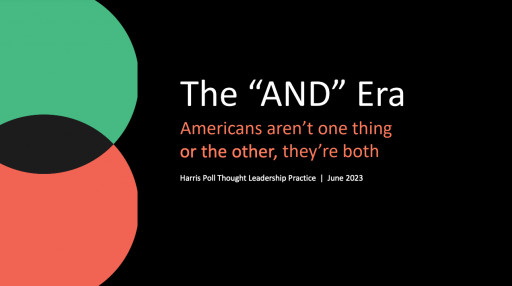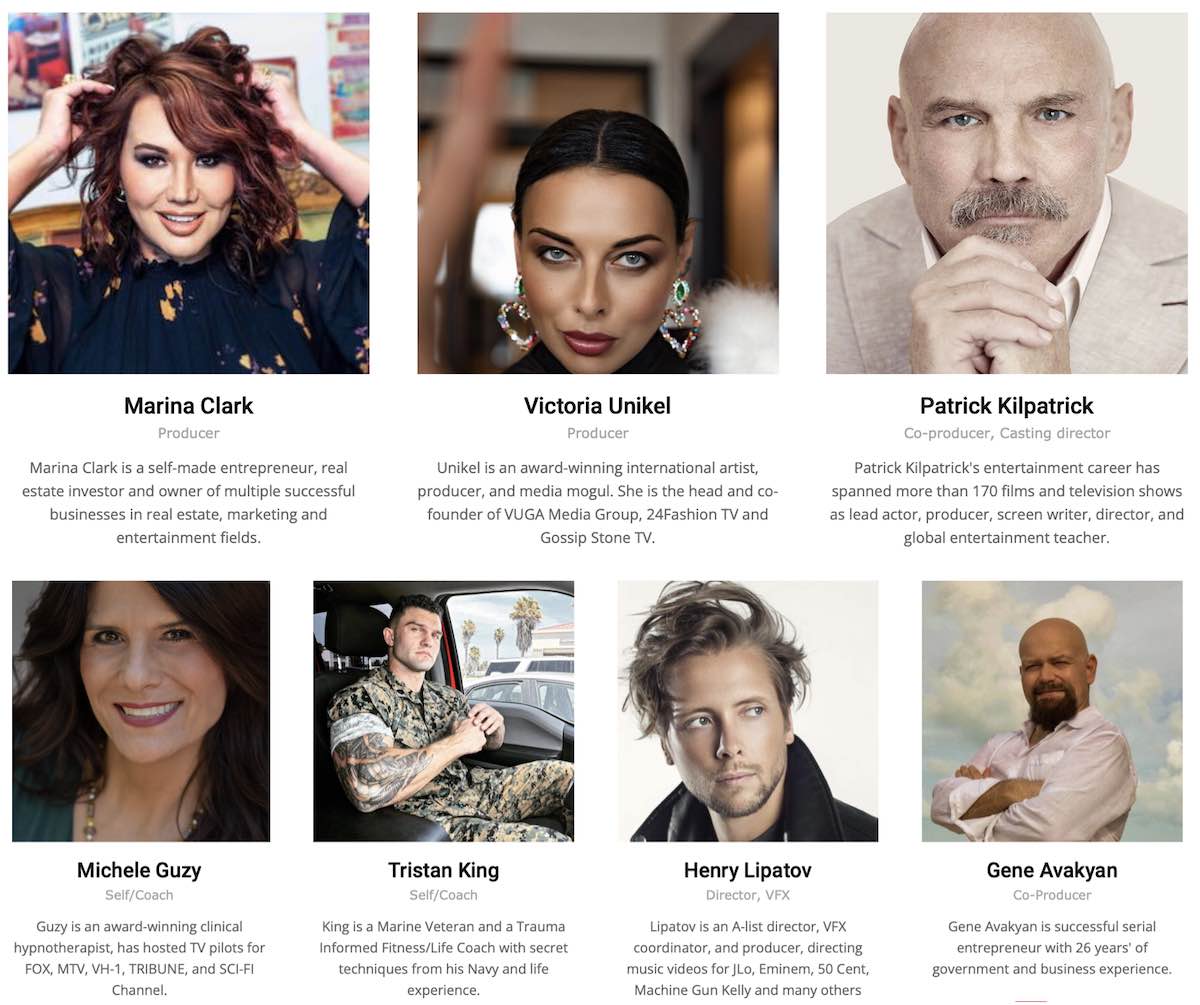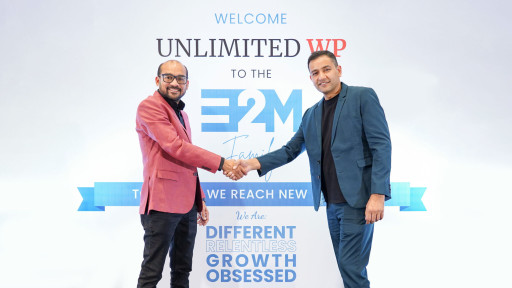NEW YORK, July 25, 2023 (Newswire.com) - According to The "And" Era Report, the latest research from The Harris Poll Thought Leadership Practice, Americans are experiencing a lifestyle that includes two things that are simultaneously true: people tightening their wallets while also spending on luxury items, being quiet yet loud at work, protesting but also being pacifists in activism, and seeing themselves as small saviors in business while also looking for stability.
The survey shows that conflicting things are going on: layoffs in some industries and labor shortages in others, and unemployment is the lowest in over 50 years but a recession looms over the horizon.
"Many of these seemingly contradictory realities coexist," Abbey Lunney, managing director at The Harris Poll Thought Leadership and Futures Practice, said. "We are entering the 'And' Era, moving beyond the binary to accept more nuanced realities."
What does the "And" era find regarding dualities and their impact on consumers today?
For finances, consumers are embracing a "split-brain budget", meaning cutting back on the basics while making room for personal luxurious items. Like someone shopping for single-ply toilet paper but wearing Gucci loafers.
- 63% of Americans agree, "I'm not going to deprive myself of the comforts of life now for a future that feels like it could change at any moment."
- 69% say, "I have cut out more 'in-between' spending (i.e., cutting out things I don't care about that much in order to splurge on something I really care about and cover basic needs)."
- 70% of Gen Zs and Millennials have found ways to splurge on themselves, such as high-quality home items (33%) or luxury fashion items (31%).
- 86% of Gen Zs and Millennials have tried to save on everyday items by shopping at dollar stores (47%), seeking deals and using coupons (47%), and opting out of more social events (35%).
"What this means for brands is don't find yourself in the middle of this mindset," Lunney said.
Americans are still enthusiastic about their work and upskilling, while also actively prioritizing their lives, reacting to an uneven system. Seventy percent of Americans see quiet quitting as "a loud statement by employees about what they are looking for."
To be more effective in their job, employees want a more meaningful investment in boundaries and opportunities to become more well-rounded, not just surface-level gestures from employers:
- 69% favor a four-day workweek
- 69% support a personal development and education budget
- 69% desire mental health support
- 61% want to dedicate work time to pursue other interests
- 59% prefer no official work hours
- 55% like having clear offline boundaries
Overall, 88% of Americans feel that "having interests separate from my job" is important, and 86% believe that "having time away from my job helps me do my job better."
"The future is unfolding with more complexities and confusion than ever before," Lunney said. "Meanwhile, people feel like their choices and opinions live in an illusionary binary world, forcing them to check one box or another. But in today's world, we can forge a different pathway where we can acknowledge that two things can be true simultaneously."
Take protesters and pacifists: Americans are exhausted by cancel culture and rage-Tok with 51% saying that "nothing has felt stable since 9/11", and 55% are pre-exhausted about "what is the next thing that will drop out of the sky."
Yet, there is also a realization that acceptance, kindness, and a connection back to humanity is the only way to move forward, with 90% agreeing that "we need to get back to what makes us universally human" and 87% feel "kindness is essential to solving societal issues and driving meaningful change."
Most Americans are frustrated about inflation (83%), gun violence (59%), homelessness (65%), the judicial system (65%), the healthcare system (62%), lack of affordable housing (59%), and abortion rights (59%).
On the other hand, Americans have also participated in acts of kindness, including letting someone else have the right of way when driving (78%), complimenting a stranger (69%), picking up litter in a public space (61%), and donated food to someone in need (58%).
What activities do Americans use to escape the complexities and pressures of today's world? Watch movies or TV shows (87%), go to a quiet place alone (76%), have chocolate or dessert (69%), scroll on social media (68%), and play video games (61%).
Regarding the future, 73% of people are concerned that nothing will change, and 69% are optimistic that something must change to deal with the chaos that is happening today.
Americans are hedging their bets on big businesses for job security while many still believe in supporting small businesses.
- 63% of tech workers have started their company post-layoff.
- 59% of employed Americans agree, "I would rather work at a big company for job security," and 89% agree, "I believe in the power of small business and want to support them."
- 48% of Americans agree, "If I started a business today, it would help solve a societal issue or gap" while 49% agree, "If I started a business today, I would be able to make it profitable in 12 months."
Finally, Americans are unsure whether AI will provide more creativity and human connections or if machines will end up restructuring our purpose in the world. AI expectations include 71% saying, "Algorithms fuel my interests" and 69% feeling "AI will unleash an abundance of creativity." The AI trepidations include 73% being "nervous about the change AI could bring to our society" and 69% saying, "AI will kill creative industries."
The survey was conducted online over three-day periods of May 5-7, May 12-14, and May 19-21, 2023, among 5,364 U.S. adults aged 18 and over, as well as salon sessions March 24-25, which focused on what it means to live a well-lived life.
For all the details, visit The "And" Era Report.
For more information, please visit The Harris Poll Thought Leadership Practice or subscribe to their Next Big Think newsletter.
About Harris Poll Thought Leadership Practice
Building on 50+ years of experience pulsing societal opinion, we design credible, creative, and culturally relevant research. Our practice drives thought leadership and unearthed trends for today's biggest brands. We are focused on helping our clients get ahead of what is next.
About Harris Poll
The Harris Poll is one of the longest-running surveys in the U.S., tracking public opinion, motivations, and social sentiment since 1963, and is now part of Harris Insights & Analytics, a global consulting and market research firm that delivers social intelligence for transformational times. We work with clients in three primary areas: building 21st-century corporate reputation, crafting brand strategy and performance tracking, and earning organic media through public relations research. Our mission is to provide insights and guidance to help leaders make the best decisions possible. To learn more, please visit www.theharrispoll.com.
Contact Information:Madeleine Moench
[email protected]
Original Source: New Harris Poll Research Shows Americans Are Split Between Two Extremes When It Comes to Money, Work, Activism, Outlook, Business, and AI
The post New Harris Poll Research Shows Americans Are Split Between Two Extremes When It Comes to Money, Work, Activism, Outlook, Business, and AI first appeared on Fun News Daily.
Innovations - Fun News Daily originally published at Innovations - Fun News Daily






